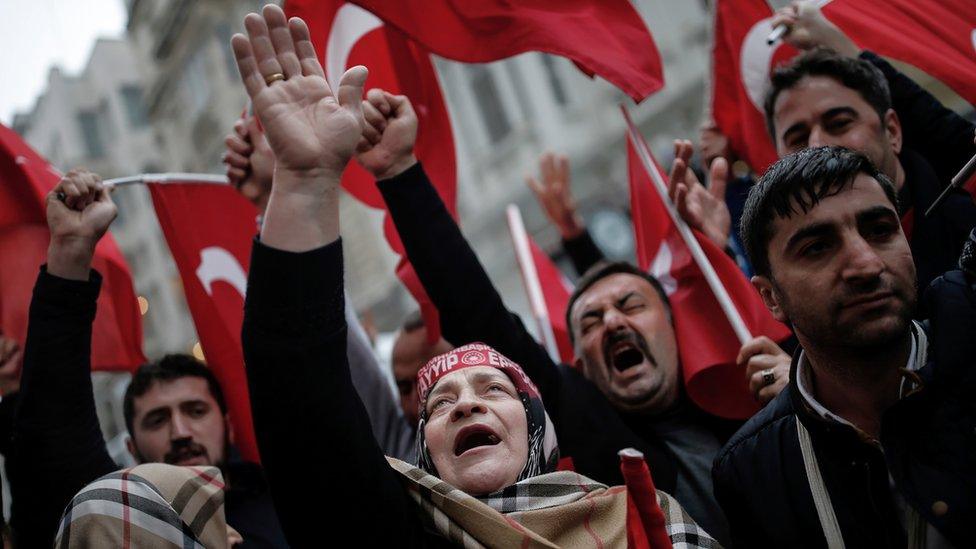Turkey 'detached from reality' - EU's Donald Tusk
- Published
- comments
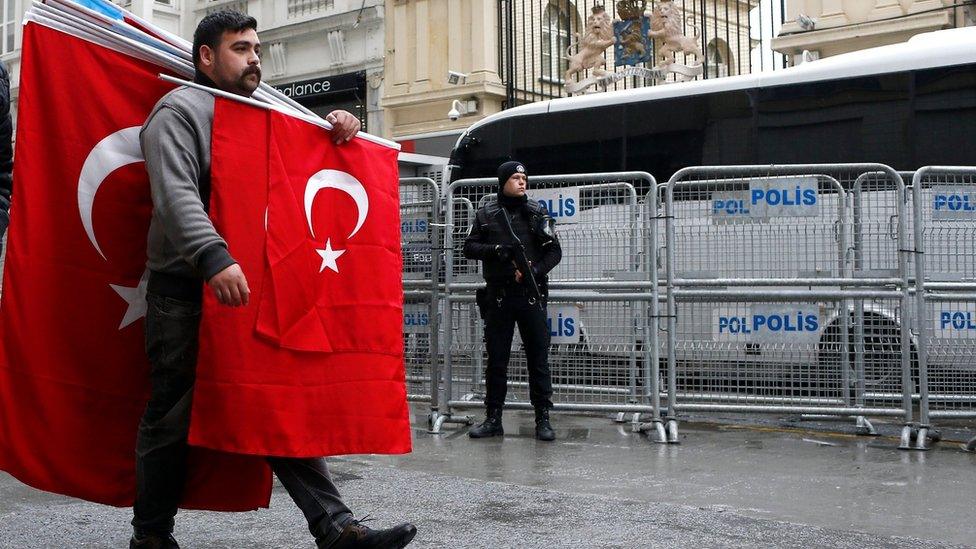
A bitter row has developed over a ban on Turkish referendum rallies by several European countries - a ban which Turkey calls racist
Turkey is "completely detached from reality" in calling the Dutch fascists, European Council President Donald Tusk has said.
His remarks come amid a row between Turkey and European nations over campaigning for a Turkish referendum.
Turkish President Recep Tayyip Erdogan has accused the Dutch government of being "Nazi remnants".
He was infuriated when a minister was barred from addressing a Rotterdam rally, sparking clashes with police.
Mr Erdogan's rhetoric intensified when he accused the Dutch of carrying out the Srebrenica massacre in Bosnia in 1995. The killings of Muslim men and boys were carried out by Bosnian Serb forces and the remarks were condemned by the Dutch prime minister as a "vile falsification".
Mr Tusk's remarks to the European Parliament, external came on the day the Dutch vote in an election in which the party of centre-right Prime Minister Mark Rutte and that of anti-immigrant Geert Wilders are frontrunners.
The Netherlands is "a place of freedom and democracy. And for sure Rotterdam," Mr Tusk said.
"The city of Erasmus, brutally destroyed by the Nazis, which today has a mayor born in Morocco," he added.
"If anyone sees fascism in Rotterdam, they are completely detached from reality."
Germany and Austria have also acted to stop Turkish rallies. The gatherings are aimed at garnering support for a "yes" vote in a 16 April referendum on giving President Erdogan greater powers.
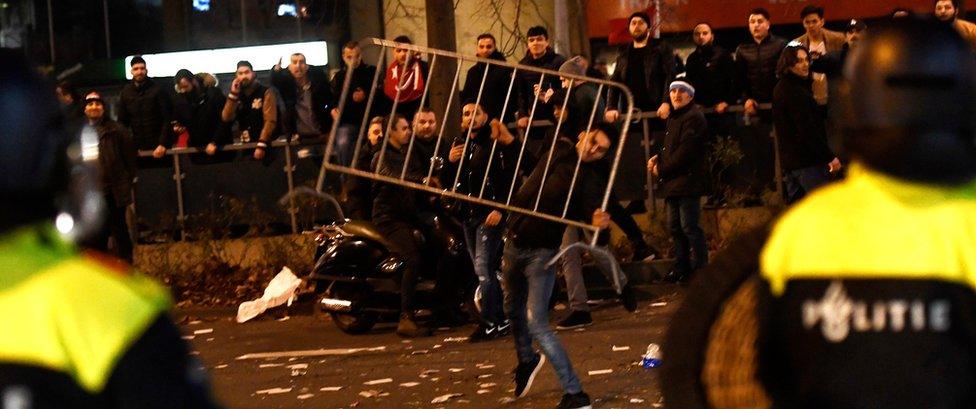
Protesters hurled objects at police with dogs near the Turkish consulate in Rotterdam on Saturday
Mr Tusk's remarks were applauded by MEPs.
European Commission chief Jean-Claude Juncker said he was "scandalised" by President Erdogan's remark, which he said "drives Turkey further away from the European Union".

What's Erdogan's game? Mark Lowen, BBC News, Istanbul
In 2005, Turks lined the road to cheer Recep Tayyip Erdogan as he returned from Brussels, where Turkey had begun EU membership talks. This week Mr Erdogan lambasted Europe's leaders with extraordinary invective. What is his game?
The answer is domestic politics. Turkey's president is entirely focused on next month's referendum on expanding his powers: the climax of his career. Polls suggest it's close. He needs to rally his nationalist support base and the far-right, who like the image of a strongman standing up to Europe.
With an overwhelmingly pro-government media that hammers home his propaganda (recent headlines include "Dutch Nazi dogs" and "They will pay the price"), he believes he has a winning formula.
That, coupled with Mr Erdogan's notorious reluctance to pull back or bow to diplomatic norms, means the inflammatory rhetoric will continue. In the process, the gulf between Turkey and Europe widens. And that's good for neither side.

Last July, President Erdogan survived an attempted coup. He says European nations failed to demonstrate their solidarity and he has come under criticism for the hundreds of thousands of civil servants purged in a crackdown in response.
In November, the European Parliament called for a suspension of Turkey's EU membership talks, and those calls seem set to grow louder, says the BBC's Mark Lowen in Istanbul.
Germany - accused last week by Mr Erdogan of "Nazi practices" - has now raised the prospect of a complete entry ban on Turkish politicians.
Peter Altmaier, chief of staff for Chancellor Angela Merkel, said such a ban would be permitted under international law but would be a "last resort. But we reserve the right to do that".
The small western German state of Saarland moved on Tuesday to ban all foreign politicians from campaigning in the state.

Turkey-Europe relations timeline
March 2015: Amid a surge of migrants trying to reach Europe via Turkey, Turkey and the EU agree a deal to see rejected asylum seekers returned to Turkey in exchange for aid and political concessions from the EU
15 July 2016: President Erdogan survives attempted coup by rebel soldiers. Western governments issue condemnation but no leaders visit in weeks following - and there is criticism of the subsequent wave of detentions and repressive measures
24 November: European Parliament votes to suspend Turkey's EU membership talks over crackdown; the following day Erdogan threatens to open the doors to another migrant surge
27 February 2017: Austria says Turkey cannot hold referendum rallies for fear of "polarising" Turkish-origin communities
5 March: After German authorities cancel referendum rallies on safety grounds, Erdogan compares German officials to Nazis - prompting German outrage. The Nazi comparison becomes a common theme of Turkish officials
11 March: Dutch authorities withdraw Turkish FM's permission to visit, prevent Turkish minister entering the Turkish consulate in Rotterdam and ban rally, prompting Mr Erdogan to brand the Dutch government "Nazi remnants and fascists"
15 March: Mr Erdogan falsely accuses the Netherlands of carrying out a massacre of Muslim men at Srebrenica, Bosnia, in 1995
- Published9 March 2017
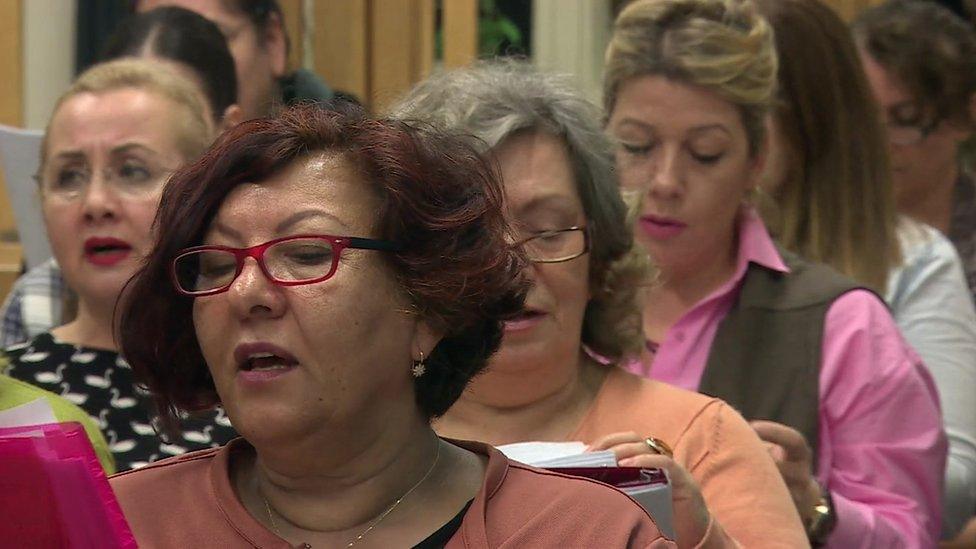
- Published13 March 2017
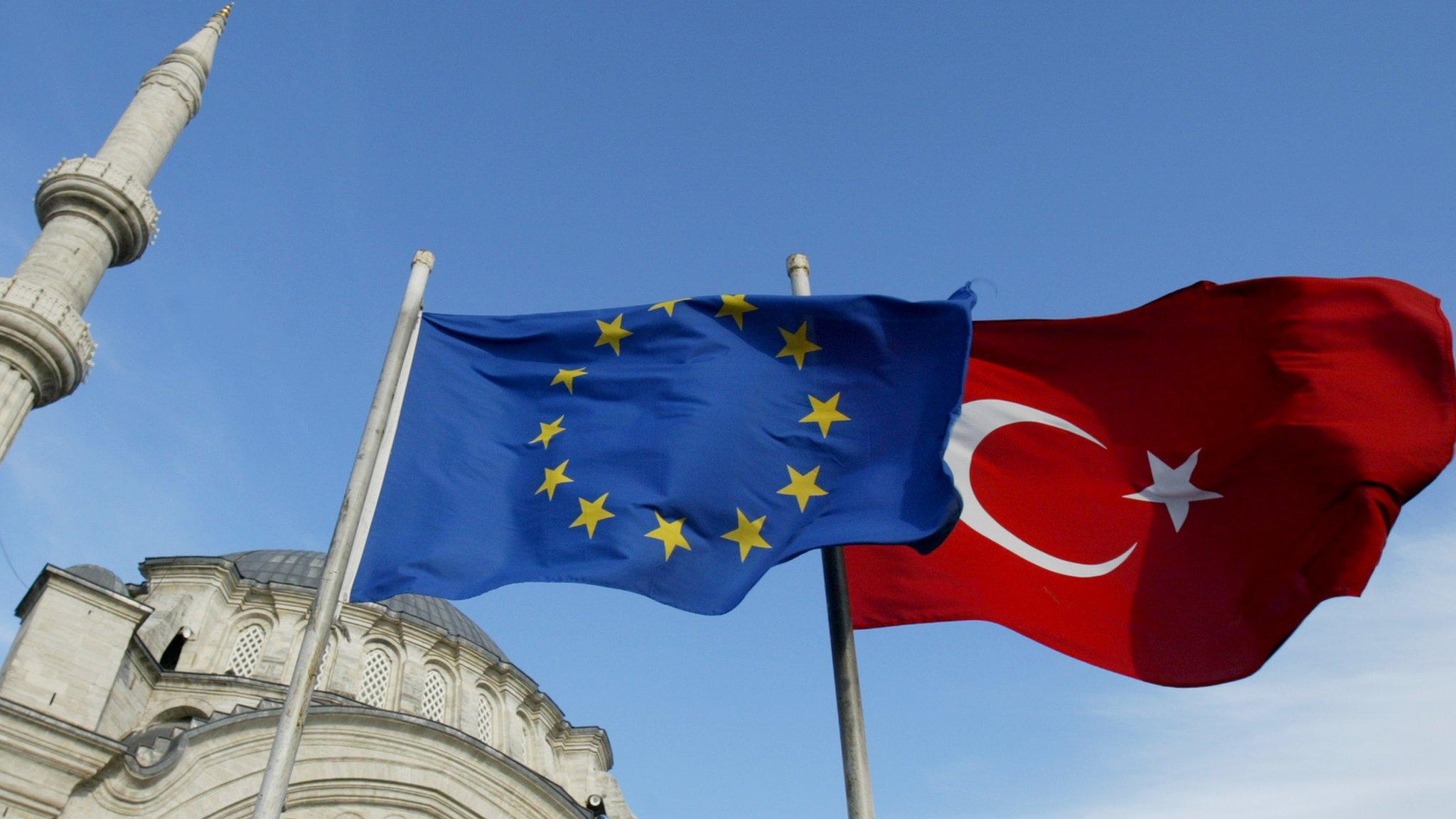
- Published13 March 2017
